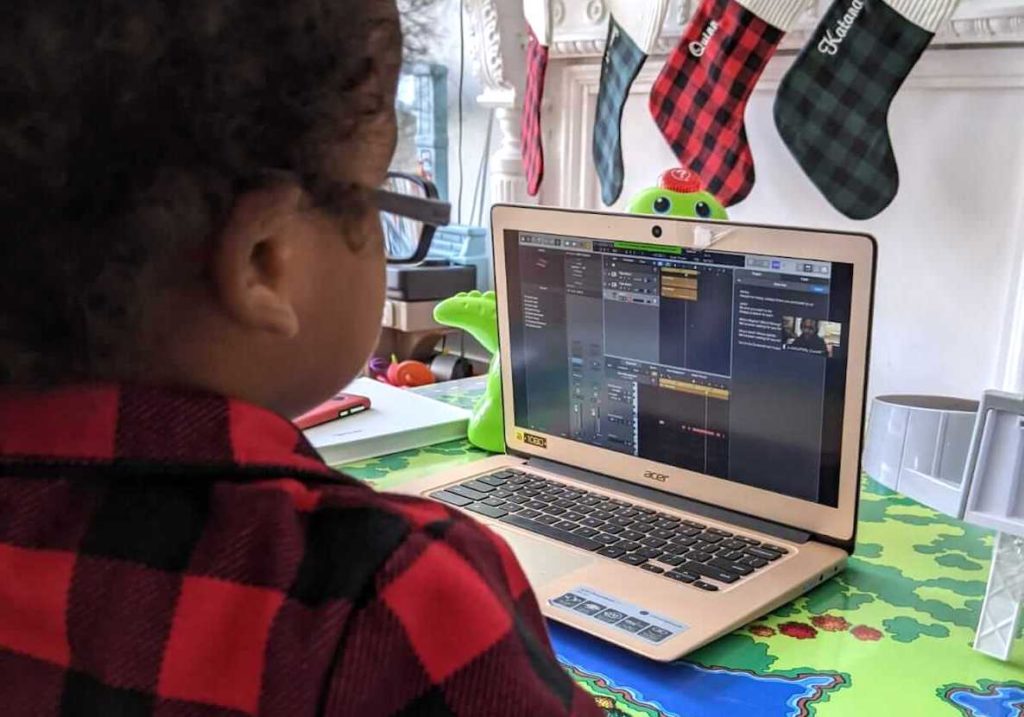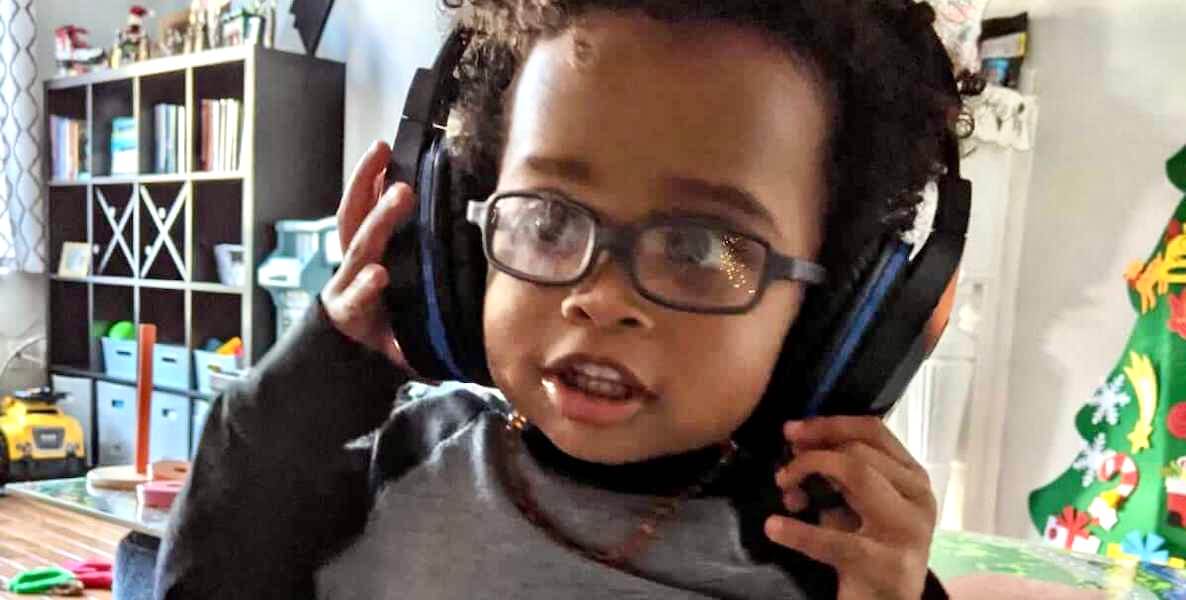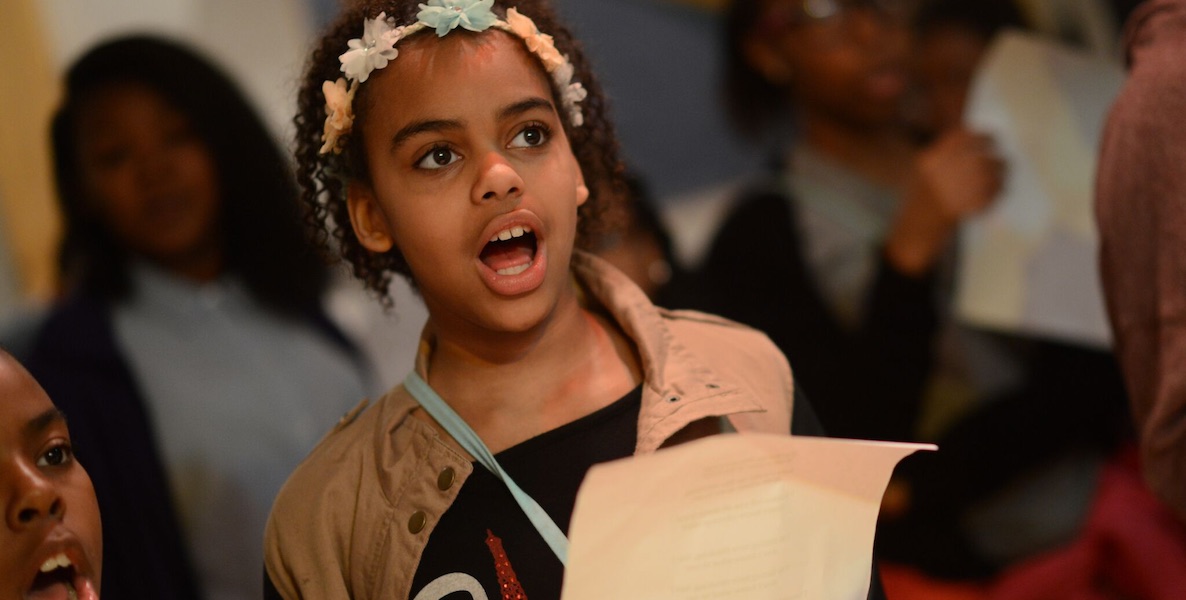In Nahuatl, the native language of Mexico, the word “appapacho” means “a caress to the soul.”
It is this tender sentiment that inspired the song Karla Santamaría and her husband, Erick Barragan, created through their participation in Lullaby Project Philadelphia, a six-week program that pairs babies and their caregivers with local professional musicians to create deeply personal lullabies while empowering parents, strengthening parent-child bonds and increasing early literacy and learning.
“The most touching part of this project is that it’s a lifetime gift,” Santamaría says. With tears welling up, she says that she likes to envision her now-13-month-old son, Ethan, carrying his one-of-a-kind lullaby with him throughout ages and stages as he grows. “If he’s feeling down, he can hear this song and feel the love and the joy that he has brought us. He can feel loved and energized, because of all the love that is in this song.”
“Parents with little ones don’t have a long history of the child to draw on, they have the immediacy of now,” Bradley says. “In this way, the giggling and all of the other little elements woven into the work are a celebration of the everyday, the celebration of the moment.”
Funded by the William Penn Foundation, the Philadelphia Lullaby Project is a program of Carnegie Hall’s Weill Music Institute in partnership with World Cafe Live. But its origins date back 10 years and just over 100 miles north of Philly, to Jacobi Hospital in the Bronx, New York.
As Manual Bagorro, creative advisor to Carnegie Hall, explains, Carnegie Hall’s Weill Music Institute was working with a group of young people whose lives were impacted by HIV and AIDS on a substantial songwriting project that evolved over a number of months.
![]() “It was complicated and beautiful and a triumph and a disaster all in one,” Bagorro says. “It was about accessing creativity in order to implement or support a change in the way people saw themselves, or the way they interacted with each other and the world.”
“It was complicated and beautiful and a triumph and a disaster all in one,” Bagorro says. “It was about accessing creativity in order to implement or support a change in the way people saw themselves, or the way they interacted with each other and the world.”
When it wrapped up, Carnegie Hall’s team went to various members of the hospital staff, asking what other patient groups might benefit from a creative intervention of this kind. The answer was fairly immediate: young mothers-to-be, particularly those who were facing very complicated personal and social and domestic situations.
Working with pregnant women, the artists involved with the program landed on the idea of collaborating to create lullabies. “Lullabies relate to cultural heritage in many really beautiful ways. They relate to a kind of nostalgia, and memories of different kinds. And there’s also something so specifically nurturing, intimate and sort of heirloom-creating about the idea of a personal song for your baby,” Bagorro says.
It was a short project—three sessions, devoted to creating a lullaby and thinking about what one wants to say to one’s baby, recording it, and then celebrating it and reflecting on the process. Everyone involved was so pleased by that program, that Carnegie started introducing it elsewhere in New York City, often in unlikely or overlooked locations: the nursery at Rose M. Singer Center at Rikers Island, various homeless shelters, like Siena House, which was featured in this New York Times Op-Doc.
As word of the program spread, it was adopted and adapted throughout the country and the world. It’s now in 44 locations, including one in Greece, where it reaches Syrian refugees in a camp just outside Athens.
The program looks different in every location, depending on the needs of the community, but one thing remains consistent: At its core, says Bagorro, each version celebrates the capacity of a parent or a family to write a nurturing song for a new human being who they love and want to show affection for.
![]() Formal evaluations of the New York City program point to its impact in six key areas: reaching families; being together; communicating; being well; continuing to thrive; and resonating.
Formal evaluations of the New York City program point to its impact in six key areas: reaching families; being together; communicating; being well; continuing to thrive; and resonating.
According to the research, mothers in the 10 Lullaby Projects reported that they were facing major life challenges, and that while participating in Lullaby, they experienced increased positive emotions and relationships, a sense of personal meaning and achievement, new insights, and hopes for the future; by comparison, when the same mothers talked about their experience outside of the program, they were “less positive, and unsure of what they will be able to do as parents or as adults in the world.”
As perfect or imperfect as one may consider their own voice or skills to be, “that voice will always be the most beautiful thing for a baby to hear,” Bagorra says.
It is well documented that music encourages caregiver-child bonding and can stimulate early language development, too, says David Bradley, producing director of arts and learning at World Cafe Live, which was chosen by Carnegie Hall to oversee the program, given its mission of being a place where artistry meets social impact. And music, Bradley adds, helps us transcend what can disconnect us. It can be a bridge—and that’s something that feels particularly necessary during a global pandemic that continues to keep us apart.
Lullaby Project Philadelphia was originally scheduled to debut in March. Community partners like Esperanza Arts Center, Health Annex, and Stephen and Sandra Sheller 11th Street Family Health Services were spreading the word to recruit interested families (Sheller being the well-known attorney and philanthropist), and World Cafe Live had assembled and trained 13 teaching artists. When Covid-19 hit, the project was put on hold.
But this fall, it kicked off via Zoom, with 22 caregivers from around the city participating in the program, a mix of group meetings and one-on-one sessions between caregivers and teaching artists, discussing parents’ wishes for their children, their hopes and dreams.

The program expanded to invite caregivers from anywhere in the city, from all backgrounds and walks of life. In between group programming, families would upload videos and photos to a shared WhatsApp group, as a way to build community and stockpile inspiration for the creation of these deeply personal lullabies.
Families came from all corners of the city. Some had prior musical experience; most did not. But they were all able to overcome their musical inhibitions to create something sacred. Teaching artist Vince Wilson came to the project not only as a musician, but as a new parent to a 4-month-old daughter. He related immediately to the families with whom he was working.
![]() “There’s this thing that happens when you become a parent, where you make your child the center of your focus, and you’re ready to do literally anything for them,” he says. “Plus, the structure of the program is built to empower parents to access parts of their creativity even they didn’t know were there. They all had artists to lean on, but they took the reins more than you would expect just because of how much of their heart is in it.”
“There’s this thing that happens when you become a parent, where you make your child the center of your focus, and you’re ready to do literally anything for them,” he says. “Plus, the structure of the program is built to empower parents to access parts of their creativity even they didn’t know were there. They all had artists to lean on, but they took the reins more than you would expect just because of how much of their heart is in it.”
Bagorra says that it’s confidence-building for parents to realize that as perfect or imperfect as one may consider their own voice or skills to be, “that voice will always be the most beautiful thing for a baby to hear.”
The results of this Philadelphia Lullaby Project’s first cohort, assembled in this 35-minute YouTube video, are breathtaking. There are parents singing, artists playing cello and guitar and banjo, babies crawling and bouncing and taking first steps.
And just around minute 16, you can see the Santamaría-Barragan family. In what is one of the most beautiful elements of their song, and even before any words are sung, there’s the sound of pure, unmitigated laughter: giggles from 13-month-old, Ethan, as recorded by his parents, and woven into his lullaby by their artist-mentor, Allison Tartalia.
It’s a reminder that as hard as the pandemic may be, as hard as parenthood may be, there are beautiful moments all around us.
This month, the newest cohort of 20-plus families began the second session of the program; the initiative will be a multi-year project, continuing through the winter and spring.
For now, Bradley emphasizes that the focus is on the present.
“Parents with little ones don’t have a long history of the child to draw on, they have the immediacy of now,” Bradley says. “In this way, the giggling and all of the other little elements woven into the work are a celebration of the everyday, the celebration of the moment.”





